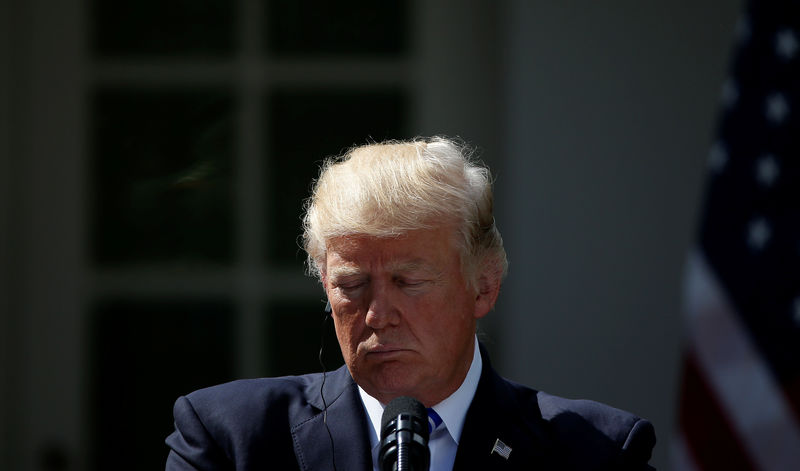By David Morgan
WASHINGTON (Reuters) - President Donald Trump told U.S. lawmakers on Tuesday he wants bipartisan cooperation on tax reform, as pressure on him to produce a legislative victory on any front escalated with the collapse of the latest Republican push to repeal Obamacare.
The administration and Republicans in Congress are due to unveil a tax plan on Wednesday. The plan has been developed over several months by six White House and congressional Republicans working behind closed doors and with no input from Democrats.
On the eve of its unveiling, Trump told members of the House of Representatives tax committee from both parties: "I've asked lawmakers of both parties to join us to discuss our framework. ... It's time for both parties to come together."
He said lawmakers should expect a "very, very powerful document" that would deliver a big tax cut for the middle class.
"We will cut taxes tremendously for the middle class - not just a little bit, but tremendously," said the president, who is set to travel to Indianapolis on Wednesday to unveil the plan.
Republicans, who control the White House and both chambers of Congress have been unable to deliver a significant legislative win on any topic since Trump took office in January.
Senate Republicans admitted failure on Tuesday in their latest push to replace the 2010 Affordable Care Act, popularly known as Obamacare,, raising pressure on the party to overhaul the tax code this year, although that difficult effort has repeatedly been delayed.
Republicans and Democrats who met with Trump on Tuesday said afterward that the president indicated an interest in working with Democrats on both tax reform and healthcare going forward.
"He said you get a better deal if it's bipartisan," said Representative Richard Neal, the panel's top Democrat.
Senate Finance Committee Chairman Orrin Hatch has also called for bipartisan tax reform.
Details of the Trump tax plan that have leaked out showed that the corporate income tax rate would be slashed to 20 percent from 35 percent, the rate for "pass-through" businesses to 25 percent from 39.6 percent, and the rate for top individual earners to 35 percent from 39.6 percent
The U.S. tax code has not been overhauled since 1986 under Republican President Ronald Reagan. In the years since, it has gotten much more complex, skewed toward special interests and insufficient for raising enough revenue to cover Washington's spending, producing a federal budget deficit.
As the Trump administration and congressional Republicans have tried in recent months to forge a tax plan, their work has focused mostly on cutting tax rates and less on attempting a comprehensive overhaul of the code.
PAYING FOR TAX CUTS?
The Trump plan is expected to be light on specifics, particularly on how to pay for its proposed tax cuts, although Neal said the White House pushed hard on the idea of eliminating the deduction for state and local tax payments. Lawmakers said some key tax rates were still in flux on Tuesday.
Without offsets such as the closing of lucrative tax loopholes to pay for lower tax rates, the proposed tax cuts would deeply cut federal revenue by about $5 trillion in a decade, according to the nonpartisan Tax Foundation think tank.
Such huge revenue losses, as well as the plan's anticipated inclusion of a tax cut for the wealthiest Americans, could make cooperation difficult for Democrats, who want tax reform to be revenue neutral and to offer no relief for top earners.
Neal said Trump showed a readiness to avoid cutting taxes for the wealthy during their meeting. "He said, quote, the rich will not benefit," said the Massachusetts Democrat.
Representative James Renacci, a Ways and Means Committee Republican, said individual tax rates were still under discussion, including the possibility of raising the tax rate for the poorest taxpayers to 12 percent from 10 percent.
"There are a lot of questions on where we're at in that area at this point. Some things are not totally tied down," Renacci told Reuters. "We've got some tweaking to do."
Among Republicans, even fiscal hawks were showing a willingness to accept huge revenue losses, predicting that aggressive tax cuts would drive future economic growth and produce new tax revenues that would pay for lower rates.
Such economic assumptions have been questioned by Democrats, who say that the Trump tax plan will unfairly favor the wealthy and that providing them with tax cuts does not drive growth.
Senate Republicans tentatively agreed last week that tax legislation could lose up to $1.5 trillion over a decade, but become revenue neutral thereafter due to economic growth.

On Tuesday, Mark Meadows, chairman of the conservative House Freedom Caucus, said he would not support a tax reform plan with a corporate tax rate above 20 percent or a small-business tax rate above 25 percent.